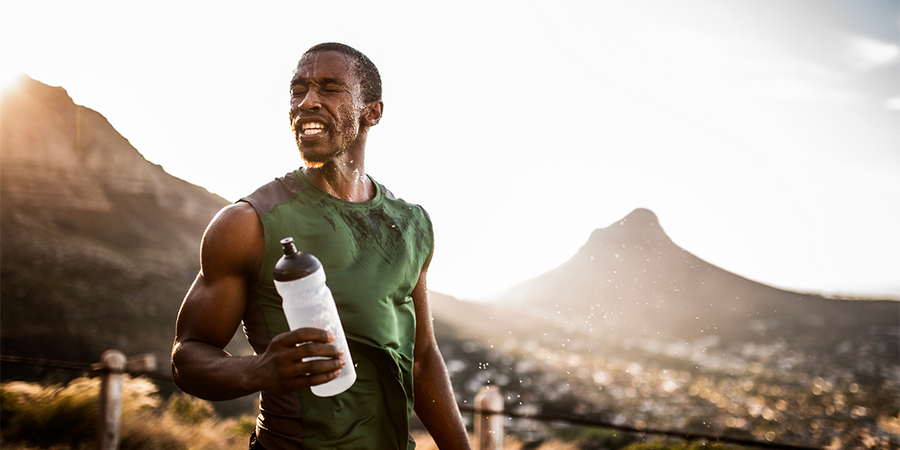
How to Prevent Dehydration — and Spot the Telltale Signs
By Jenessa Connor
You don't just need water; you are water. Around 60% of the human body is H2O, which is crucial to a variety of vital functions, from digestion to temperature regulation. Become dehydrated, and you can face very serious health risks. However, if you know how to prevent dehydration, the dangers and discomfort associated with the condition are relatively easy to avoid. (Pro tip: Drink water early and often.)
Don't let minor dehydration keep you from performing your best — you know how muscle cramps and fatigue can quickly turn an awesome workout into an awful one. Read on to learn more.
Fight dehydration and grind through your workout with LADDER Hydration.
.
What Is Dehydration?
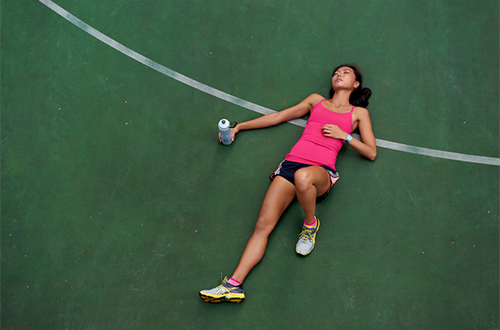
To explain dehydration, Todd Buckingham, Ph.D., lead exercise physiologist at Mary Free Bed Sports Rehabilitation in Grand Rapids, Michigan, starts with the components of blood: red blood cells and plasma.
“Plasma is a liquidy substance that helps transport red blood cells to the muscles in order to deliver oxygen to provide energy for those muscles," he says. The sweat that our body uses for temperature regulations comes from plasma. So when we lose water that's not replenished (aka dehydration), blood becomes thicker and more viscous. “It cannot travel through the blood vessels as easily and puts more stress and strain on the heart," he says.
This change in the plasma triggers a series of physiological mechanisms designed to regulate and maintain water balance. That's when we begin to experience the signs of dehydration.
.
What Are the Signs of Dehydration?
While some signs of dehydration are obvious, others are more subtle. If you experience any of the following symptoms, you could be dehydrated:
- Feeling thirsty
- Dry mouth
- Dry skin
- Reduced or dark-colored urine
- Sweating less than usual
- Headache
- Dizziness
- Irritability and sleepiness
In severe cases of dehydration, people may experience fainting, rapid heartbeat and breathing, confusion, or a lack of urination. Any of these signs of severe dehydration warrant immediate medical attention.
.
What Are the Ways to Prevent Dehydration?
Dehydration — even minor cases — can affect everything from cognition to athletic performance to kidney function. More severe cases, especially in infants and older people, can be deadly. So, it's important for everyone to not only know the signs of dehydration but also learn how to prevent it in the first place.
1. Hydrate long before you exercise.
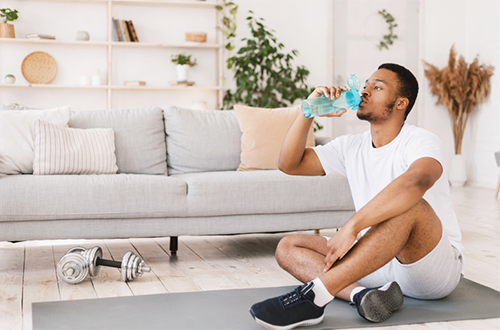
Don't wait for that 60-second break in the middle of your HIIT class to start drinking fluids. Aim to sip water throughout the day and start every workout fully hydrated, says Buckingham.
“If you start exercise at a 100% hydration level, it will take you longer to become dehydrated than if you start exercise at an 80% hydration level," he says. “It will also give you more total blood volume, meaning it will be easier for your heart to pump the red blood cells to the muscles and provide them with the oxygen necessary to produce energy."
Bottom line: If you want to get the most from every workout, you have to stay hydrated, just like you have to come fueled up.
2. Set a specific hydration goal.
We're more likely to achieve goals that are specific and measurable, so set a daily fluid intake goal and use the tools that work for you — calendar reminders, smartwatch notifications, a special water bottle — to meet that goal.
Wondering how much water you actually need? For years, “eight glasses a day" has been the universal recommendation for adults, but according to the National Academies of Science, Engineering, and Medicine, we probably need to drink more.
For men, the recommendation for total water intake (including beverages and the water content in food) is 3.7 liters (about 16 cups) For women, the recommendation for total water intake is 2.7 liters (about 11 cups).
Of course, these are general guidelines. How much fluid you personally need will depend on your body composition, your physical activity level, and the climate where you live. Pay attention to your sense of thirst levels and the color of your urine, and adjust accordingly.
Gross but helpful: Ideally, your urine should be pale and plentiful. If yours is darker and sparse, drink up!
3. Make hydration appealing.
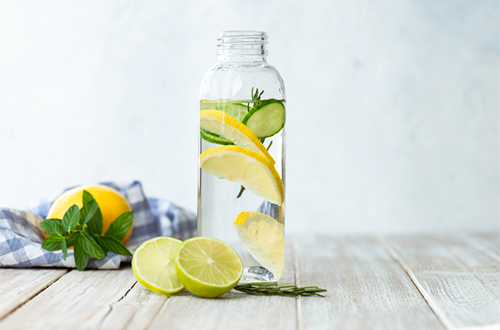
While tap water is an adequate, readily available beverage option on an everyday basis, you don't have to stick to plain H2O to stay hydrated. Try dressing up a glass of water with a squeeze of citrus or a splash of fruit juice. If you like a little fizz, opt for unsweetened seltzer.
Experiment with temperature: Use ice cubes and an insulated bottle to keep your drink chilled throughout the day, or sip on hot herbal tea. Ultimately, you consume more of what you actually enjoy, so take the time to find your drink of choice.
Remember that your recovery and prep routines are equally important for athletic success. Hitting your daily water goals might help you with your goals at the gym or on the court, too.
4. Eat foods with high water content.
Part of your fluid intake comes from the food you eat. Incorporating foods with high water content into your diet is an easy way to help meet your daily requirement.
While soups, stews, smoothies, and cereal with milk are obvious options, most fruits and vegetables naturally contain high levels of water. For example, cucumbers are 97% water, tomatoes are 95% water, and romaine lettuce is 95% water. Eating a basic salad alongside your lunch can help you stay hydrated throughout the day.
5. Drink electrolyte beverages when necessary.
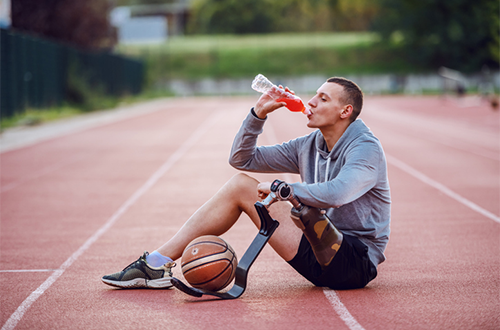
While water is typically sufficient for everyday activity, you may want to opt for an electrolyte beverage like LADDER Hydration when you're engaging in rigorous exercise or the weather is very hot and humid.
“Sweat is mostly comprised of water, but it also contains electrolytes (primarily, sodium, potassium, calcium, and magnesium) that are responsible for many physiological functions in the body," says Buckingham. “Sodium, in particular, plays an important role in maintaining fluid balance in the body. When ingested with water, sodium will pull that water into the bloodstream. This is because the sodium (and the associated water) will travel from areas of high concentration (the drink ingested) to areas of low concentration (the blood). This is why sports drinks help to replenish the body's fluids better than water alone."
And, LADDER Hydration uniquely features the Refuel Ratio, with those four key electrolytes plus fast-absorbing carbohydrates to help your body replenish what you lose when you sweat, better absorb water during your workout, and fight fatigue.*
.
How Can I Reduce Dehydration Quickly?
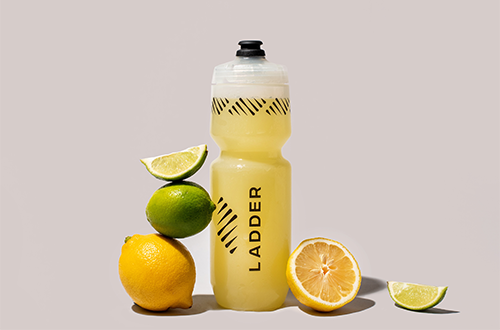
Reducing dehydration starts with consuming fluids as soon as possible, says Buckingham. “This means taking in a drink that contains a high amount of sodium," he explains. "This will cause the body to retain more of that water ingested instead of excreting it through the urine." LADDER Hydration includes 390 milligrams of sodium, plus calcium, magnesium, and potassium, the combination of which supports hydration, performance, and recovery.*
In severe cases, treatment for dehydration may require the administration of intravenous fluids and monitoring. So if you or anyone you know is displaying any of the symptoms indicated above, seek medical attention immediately.
*These statements have not been evaluated by the Food and Drug Administration. This product is not intended to diagnose, treat, cure, or prevent any disease.



